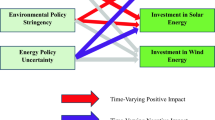Abstract
Although there is widespread agreement about the dangers of global warming and the resulting need to cut down emissions, there does not seem to be general agreement about the exact form the policy should take or the timing of its adoption. Failure to adopt and implement policies against global warming reflects the complexity of the problem, the uncertainties of climate change and the cost of policy adoption. Issues associated with the interactions between uncertainties and irreversibilities in determining the timing of policy adoption are analyzed by using the methodology of optimal stopping rules. Optimal policy functions are derived for cooperative and noncooperative solutions, with differential game representation. Issues associated with the empirical application of the optimal policy rules are also considered.
Similar content being viewed by others
References
Arrow, K. J and A. Fisher (1974), ‘Environmental Preservation, Uncertainty and Irreversibility’, Quarterly Journal of Economics 88, 312–319.
Basar, T. (1989), ‘Time Consistency and Robustness of Equilibria in Non-cooperative Dynamic Games’, in F. van der Ploeg and A. J. de Zeeuw, eds., Dynamic Policy Games in Economics. Amsterdam: North-Holland.
Basar, T. and G. J. Olsder (1982), Dynamic Non-cooperative Game Theory. New York: Academic Press.
Conrad, J. M. (1997), ‘Global Warming: When to Bite the Bullet’, Land Economics 73, 164–173.
Dixit, A. K. and R. S. Pindyck (1994), Investment under Uncertainty. Princeton, NJ: Princeton University Press.
Dockner, E. and N. Van Long (1993), ‘International Pollution Control: Cooperative versus Non-cooperative Strategies’, Journal of Environmental Economics and Management 25, 13–29.
Fankhauser, S. and S. Kverndokk (1996), ‘The Global Warming Game Simulations of a CO2-Reduction Agreement’, Resource and Energy Economics 18, 83–102.
Fisher, A. C. and M. Hanemann (1986), ‘Environmental Damages and Option Values’, Natural Resource Modelling 1, 111–124.
Fisher, A. C. and M. Hanemann (1987), ‘Quasi-Option Value: Some Misconceptions Dispelled’, Journal of Environmental Economics and Management 14, 183–190.
Fleming, W. and H. M. Soner (1993), Controlled Markov Process and Viscosity Solutions. Springer-Verlag.
Hoel, M. and I. Isaksen (1995), ‘The Environmental Costs of Greenhouse Gas Emissions’, in C. Carraro and J. Filar, eds., Control and Game-Theoretic Models of the Environment. Boston: Birkhauser.
Journal of Economic Perspectives (1993), ‘Symposium on Global Warming’, 7, 3–86.
Kolstad, C. D. (1996), ‘Learning and Stock Effects in Environmental Regulation: The Case of Greenhouse Gas Emissions’, Journal of Environmental Economics and Management 31(1), 1–18.
Kverndokk, S. (1993), ‘Global CO2 Agreements: A Cost-Effective Approach’, The Energy Journal 14, 91–112.
Malliaris, A. G. and W. A. Brock (1982), Stochastic Methods in Economics and Finance. Amsterdam: North-Holland.
Nordhaus, W. D. (1992), The DICE Model: Background and Structure of an Integrated Dynamic Climate Model of the Economics of Global Warming. New Haven: Yale University, mimeo.
Nordhaus, W. D. and Z. Yang (1996), ‘A Regional Dynamic General-Equilibrium Model of Alternative Climate-Change Strategies’, American Economic Review 86, 741–765.
OECD (1992a), Convention on Climate Change: Economic Aspects of Negotiations. Paris.
OECD (1992b), Global Warming the Benefits from Emission Abatement. Paris.
OECD (1995), Global Warming: Economic Dimensions and Policy Responses. Paris.
The Economist (1997), ‘Sharing the Greenhouse’, 11 October 1997.
van der Ploeg, F. and A. J. de Zeeuw (1992), ‘International Aspects of Pollution Control’, Environmental and Resource Economics 2, 117–139.
Xepapadeas, A. (1992), ‘Environmental Policy Design and Dynamic Nonpoint-Source Pollution’, Journal of Environmental Economics and Management 23(1), 22–39.
Xepapadeas, A. (1995), ‘Induced Technical Change and International Agreements Under Greenhouse Warming’, Resource and Energy Economics 17, 1–23.
Xepapadeas, A. and A. Yiannaka (1997), ‘Measuring Benefits and Damages from Carbon Dioxide Emissions and International Agreements to Slow Down Greenhouse Warming’, in C. Carraro, ed., International Environmental Negotiations. Aldershot: Edward Elgar.
Author information
Authors and Affiliations
Rights and permissions
About this article
Cite this article
Xepapadeas, A. Policy Adoption Rules and Global Warming. Environ Resource Econ 11, 635–646 (1998). https://doi.org/10.1023/A:1008299430205
Issue Date:
DOI: https://doi.org/10.1023/A:1008299430205




